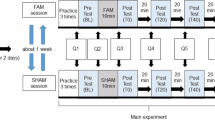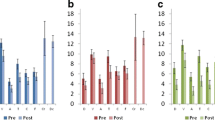Abstract
Our previous research showed that short term meditation training reduces the time to resolve conflict in the flanker task. Studies also show that resting alpha increases with long term meditation practice. The aim of this study is to determine whether short term meditation training both increases resting alpha activity and reduces the time to resolve conflict in the Stroop task and whether these two effects are related. Forty-three Chinese undergraduates were randomly assigned an experiment group given 5 days meditation training using integrative body-mind training (IBMT) and a relaxation training control. After training, only the IBMT group showed decreased conflict reaction time (RT), and increased resting mean alpha power. Moreover, the higher the enhancement of resting alpha power, the stronger the improvement of conflict RT. The results indicate that short term meditation diffusely enhances alpha and improves the ability to deal with conflict and moreover these two effects are positively related.



Similar content being viewed by others
References
Aftanas, L. I., & Golocheikine, S. A. (2001). Human anterior and frontal midline theta and lower alpha reflect emotionally positive state and internalized attention: High-resolution EEG investigation of meditation. Neuroscience Letters, 310(1), 57–60.
Aftanas, L., & Golosheykin, S. (2005). Impact of regular meditation practice on EEG activity at rest and during evoked negative emotions. International Journal of Neuroscience, 115(6), 893–909.
Bernstein, D. A., & Borkovec, T. D. (1973). Progressive relaxation training. Champaign, IL: Research Press.
Chan, D., & Woollacott, M. (2007). Effects of level of meditation experience on attentional focus: Is the efficiency of executive or orientation networks improved? Journal of Alternative and Complementary Medicine, 13(6), 651–657.
Hardt, J. V., & Kamiya, J. (1978). Anxiety change through electroencephalographic alpha feedback seen only in high anxiety subjects. Science, 201(4350), 79–81.
Klimesch, W. (1999). EEG alpha and theta oscillations reflect cognitive and memory performance: A review and analysis. Brain Research. Brain Research Reviews, 29(2–3), 169–195.
Kozasa, E. H., Sato, J. R., Lacerda, S. S., Barreiros, M. A., Radvany, J., Russell, T. A., et al. (2012). Meditation training increases brain efficiency in an attention task. Neuroimage, 59(1), 745–749.
Petersen, S. E., & Posner, M. I. (2012). The attention system of the human brain: Years after. Annual Review of Neuroscience, 35, 71–89.
Posner, M. I., Rothbart, M. K., Sheese, B. E., & Tang, Y. (2007). The anterior cingulate gyrus and the mechanism of self-regulation. Cognitive, Affective, & Behavioral Neuroscience, 7(4), 391–395.
Ramos-Loyo, J., Gonzalez-Garrido, A. A., Amezcua, C., & Guevara, M. A. (2004). Relationship between resting alpha activity and the ERPs obtained during a highly demanding selective attention task. International Journal of Psychophysiology, 54(3), 251–262.
Stroop, J. R. (1935). Studies of interference in serial verbal reactions. Journal of Experimental Psychology, 18, 643–661.
Takahashi, T., Murata, T., Hamada, T., Omori, M., Kosaka, H., Kikuchi, M., et al. (2005). Changes in EEG and autonomic nervous activity during meditation and their association with personality traits. International Journal of Psychophysiology, 55(2), 199–207.
Tang, Y. Y., Lu, Q., Geng, X., Stein, E. A., Yang, Y., & Posner, M. I. (2010). Short-term meditation induces white matter changes in the anterior cingulate. Proceedings of the National Academy of Sciences USA, 107(35), 15649–15652.
Tang, Y. Y., Ma, Y., Fan, Y., Feng, H., Wang, J., Feng, S., et al. (2009). Central and autonomic nervous system interaction is altered by short-term meditation. Proceedings of the National Academy of Sciences USA, 106(22), 8865–8870.
Tang, Y. Y., Ma, Y., Wang, J., Fan, Y., Feng, S., Lu, Q., et al. (2007). Short-term meditation training improves attention and self-regulation. Proceedings of the National Academy of Sciences USA, 104(43), 17152–17156.
Tang, Y. Y., & Posner, M. I. (2009). Attention training and attention state training. Trends in Cognitive Sciences, 13(5), 222–227.
Tang, Y. Y., Rothbart, M. K., & Posner, M. I. (2012). Neural correlates of establishing, maintaining, and switching brain states. Trends in Cognitive Sciences, 16(6), 330–337.
Travis, F. T. (1991). Eyes open and TM EEG patterns after one and after eight years of TM practice. Psychophysiology, 28, 58.
van der Hiele, K., Bollen, E. L., Vein, A. A., Reijntjes, R. H., Westendorp, R. G., van Buchem, M. A., et al. (2008). EEG markers of future cognitive performance in the elderly. Journal of Clinical Neurophysiology, 25(2), 83–89.
West, R., & Bell, M. A. (1997). Stroop color-word interference and electroencephalogram activation: Evidence for age-related decline of the anterior attention system. Neuropsychology, 11(3), 421–427.
Acknowledgments
This study is supported by the Office of Naval Research.
Conflict of interest
There are no conflicts of interest.
Author information
Authors and Affiliations
Corresponding author
Rights and permissions
About this article
Cite this article
Fan, Y., Tang, YY., Tang, R. et al. Short Term Integrative Meditation Improves Resting Alpha Activity and Stroop Performance. Appl Psychophysiol Biofeedback 39, 213–217 (2014). https://doi.org/10.1007/s10484-014-9258-5
Published:
Issue Date:
DOI: https://doi.org/10.1007/s10484-014-9258-5




